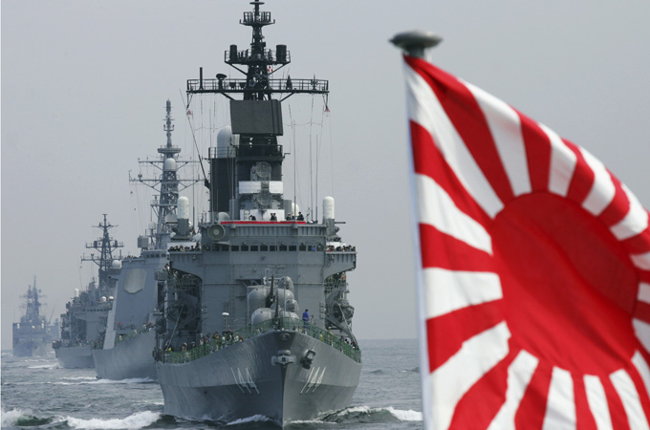In an article published in a July 14th issue of Javan Newspaper, Seyyed Rahim Ne’mati writes:
Japanese Prime Minister Shinzo Abe announced, at the 13th IISS Asia Security Summit in Singapore on May 30, 2014, his country’s decision to play a more active role in defending the territories and waters of its neighbors. It came after officials in Tokyo began to have a new take on Japan’s security and that of the wider Pacific region. As Japan prepares to walk down a path different from the one it chose after World War II, the world must wait to see what impact Tokyo’s new policy will have at home and abroad.
Post-WWII Norm
Japan followed in the footsteps of Germany to concede defeat in the Second World War. This saw the wide expanse of the Japan Empire along the Pacific narrow to mainland Japan and a few disputed islands claimed by neighboring countries. Japan’s defeat called for a future strategy to prevent the island nation in East Asia from returning to pre-war status and posing a threat to its neighbors. The strategy in question found its way into efforts to piece together a post-war Constitution. Article Nine of the charter has explicitly said that Japan can have military power only to defend its territories and people. The constitutional restriction caused the country’s military to be plagued by drastic shortcomings both in terms of talents and objectives, something which barred Japan from establishing extensive military cooperation with the United States, a close ally. Whether Article Nine was enshrined in the Constitution courtesy of pressures from the winning nations or it came thanks to pacifist forces inside the country is still far from clear, but the reality check here is that for more than six decades Japan has acted according to the very article and China’s rapid economic-military growth over the last several years has served as a wakeup call for people like Abe to give a second thought to this constitutional article.
Domestic look
The options Abe has at hand differ from the change he has in mind. According to some, Japan is expected to either lend support to an ally such as the US beyond its own territories, establish direct military cooperation with regional countries or bolster its direct regional presence to defend its interests, to name a few. No matter which option is chosen, Abe still faces key problems at home. A recent survey conducted by a Japanese pollster shows that Abe faces firm opposition to his security reforms. Fifty percent of those polled said they were opposed to Abe’s security plans. Only 34 percent of respondents expressed their approval of his plans. Issues associated with expansionism are among the major concerns of the opponents of Abe’s plan. Apart from possible huge costs the question of expansionism would impose, it remains unclear whether it can practically result in greater security for Japan or not. Moreover, some intellectuals in Japan are concerned that Abe’s interpretation of the constitutional reforms could put in harm’s way the existing political norms which have seen Japan walk down a peaceful path both in the region and beyond since World War Two, or dent and even totally overlook the deals and treaties which were sealed following the 1939-1945 war.
The US military presence in Japan together with the unforgettable scars of the atomic bombings of Japan’s Hiroshima and Nagasaki keeps fuelling anti-war sentiments among the Japanese people. They serve as key psychological factors which disapprove of Japan’s military expansionism. This is why Abe’s insistence on his own version (of the law) and his determination to change the Constitution will carry a political price for him. This is probably a reason for Abe’s guarded moves despite the fact that his party holds a majority in both houses of the country’s bicameral parliament. He has to move cautiously when it comes to advancing his own interpretation which would lead to constitutional reforms and alteration of Article Nine. By no means does he want to miss out on this opportunity only because of hasty decisions or measures.
Outside look
To start with, Abe chose the security conference in Singapore to raise the issue from the perspective of the entire Pacific Ocean region, and not from a domestic angle alone. It added up to a guarded step on his part because such a start at home wouldn’t have come without consequences. The situation beyond national borders is totally different and would come with fewer domestic consequences. On the other hand, his move has naturally met with reactions and concerns in the Pacific region. Such concerns are of more significance when it comes to China and South Korea which still remember the bitter memories of Japan’s colonial past.
Apart from their historical memories, these two countries are currently at odds with Japan over territorial issues. This common concern seems very likely to see these two states take a path different from that of the past and put more and more mutual cooperation on the agenda down the road. A trip by Chinese President Xi Jinping to South Korea back on July 3 was unprecedented; something which may raise concerns for North Korea, China’s traditional ally, but it looks justifiable enough when it comes to the common concerns of the two countries about Japan. There is a faint possibility that China has been thinking about the creation of a coalition to counter the expansionism pursued by Abe and other Japanese officials, and to that end South Korea and their common historical memory on Japan’s colonial past could be a good beginning for Beijing. All in all, the Japanese premier is likely toface serious challenges at home and abroad before achieving his security goals. Domestically, such challenges could deal a heavy political blow to him; and internationally, they could rewrite security rules all across the Pacific.
